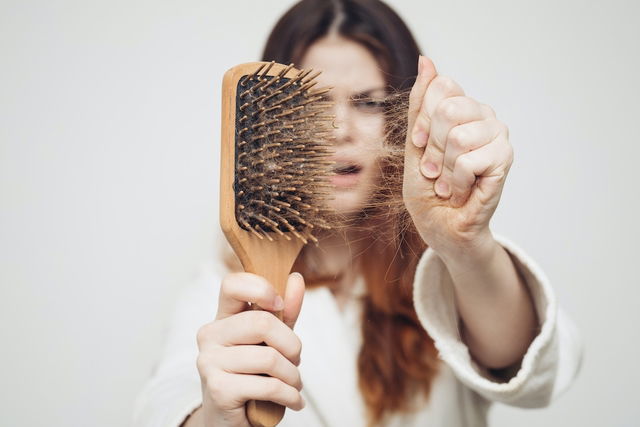Excessive hair loss can be caused by hormonal changes, menopause, stress, malnutrition or anemia.
Hair loss is also common in the postpartum phase due to hormonal changes. People with fungal scalp infections may also experience hair loss, as well as people taking certain medications (primarily cancer treatments).
You are advised to consult a dermatologist to identify the underlying cause of hair loss and guide treatment. The doctor may recommend dietary changes, medications, nutritional supplements, esthetic procedures (like carboxytherapy) or surgical interventions (like implants or capillary transplants).

The main causes of hair loss are:
1. Malnutrition
A diet that is poor in nutrients, vitamins and minerals (like protein, zinc, iron, vitamin A and vitamin C) can cause hair loss. These nutrients are important for hair growth and capillary strength.
What to do: You should adhere to a balanced, nutritious diet that is rich in protein, iron, zinc and vitamins. Great foods to implement into your diet include lean meats, cheese, milk, fruit, legumes and fresh vegetables, as recommended by a registered dietitian. A doctor or registered dietitian can prescribe supplements as necessary to ensure adequate nutrient intake.
2. Excess stress and anxiety
Excess stress and anxiety can lead to an imbalance of cortisol hormones. High cortisol levels can lead to excessive hair loss with increased loss of hair strands every day. This is related to a condition called telogen effluvium, which is characterized by generalized hair loss and an interruption to normal hair growth.
Stress and anxiety can also affect how your body digests and absorbs nutrients, leading to imbalances in vitamins that are essential for hair growth and strength.
What to do: It is important to identify the underlying cause of stress, whether it is related to work, school or family problems. You should engage in activities that give you pleasure, like hanging out with friends, exercising and developing a hobby (like sewing or photography). Seeing a psychologist can also help to heighten self-awareness and help to cope with hard emotions.
Check out these herbs for anxiety and stress that you can use to prepare a relaxing tea at home.
3. COVID-19
Some people with COVID-19 may also notice a noted increase in hair loss within a few weeks of infection, with losses persisting for 6 to 9 months. Some studies show that this is related to the pro-inflammatory cytokines from the infection, although it may also be a consequence of stress, anxiety and/or fever that can occur with illness.
What to do: In most cases, COVID-19 related hair loss resolves within 6 to 9 months of the initial infection, without any specific treatment. It may be possible to notice, however, hair strands of varying lengths along the scalp.
Although this is a situation that does not require treatment, you may consult a dermatologist for a more thorough assessment of your scalp and general health status to determine the underlying cause and evaluate the need for treatment.
4. Menopause
Menopause is a period that marks the end of menstruation, which is a normal process that occurs with aging. The ovaries stop producing estrogen, leading to hormonal changes that can promote hair loss. Learn more about menopause symptoms that can start to emerge during this phase.
A similar process, called andropause, can occur in men, in which testosterone production becomes reduced in the testicles. This can also lead to hair loss in men.
What to do: You should consult a gynecologist (for women) or an endocrinologist to evaluate the need for hormonal replacement therapy to prevent further hair losses. You can also prepare these teas for menopause to help lessen symptoms.
5. Postpartum phase
During pregnancy, hormones like estrogen, progesterone, oxytocin, HCG and prolactin become elevated in the body. This can give the hair a healthier, shinier appearance. Immediately after delivery, hormonal levels decrease rapidly, especially estrogen and progesterone. They return to normal levels with 24 hours of the birth of the baby, which can cause weaker hair that easily falls out.
What to do: Maintain a nutritious and balanced diet that is rich in fruits, legumes and fresh vegetables to ensure you and the baby continue to receive adequate nutrition. Your OB may recommend vitamins and supplements during the breastfeeding phase to help avoid further hair loss. Read about the postpartum diet which can help to support weight loss and hormonal stabilization during this phase.
6. Anemia
Anemia caused by iron deficiency can lead to excessive hair loss. Iron is a mineral that is essential for the production of hemoglobin, a protein that carries oxygen on red blood cells to other tissues in the body (including the scalp). Less oxygen to the scalp can lead to weaker hair strands and hair loss.
See the other anemia symptoms that can occur, and complete our online anemia symptoms quiz if you suspect you may have this condition.
What to do: You should consult a hematologist to evaluate the need for iron supplementation. An iron-rich diet guided by a registered dietitian can also be beneficial, as foods like seafood, liver, pumpkin seeds and leafy greens are natural iron sources. Learn about the foods for anemia that you should incorporate into your diet.
7. Using chemical products on the hair
Using chemical products on the hair, like formol, permanent relaxants and hair dye can dry out hair strands and make them more prone to breakage, especially at the scalp. These chemicals can cause damage along the hair cuticle, leading to hair loss.
What to do: After using chemical products, it is essential to care for your hair using mild shampoos and conditioners. You should hydrate your hair at least once a weak, and avoid using hair dryers or irons. If your hair continues to fall, you are advised to see a dermatologist about specific hydration formulas, or to see whether supplements can help to restore hair roots and promote healthy hair growth.
See which foods for hair growth you should increase consumption of to help strengthen your hair and prevent hair loss.
8. Medication use
Some medications, like warfarin, heparin, carbimazole, isotretinoin, acitretin, lithium, beta blockers, colchicine, amphetamines and anti-cancer drugs can cause hair loss as a side effect.
What to do: If you notice hair loss, you should see your prescribing doctor. Avoid discontinuing the medication abruptly on your own. You can also consult a dermatologist that can prescribe supplements that do not interfere with the medication’s action if the medication ids necessary. Cancer treatments and some chemotherapies can cause hair loss, although hair will typically regrow once treatment as terminated.
9. Fungal infections
A fungal scalp infection can lead to excessive hair loss, as well as intense itching of the scalp. See what else can cause intense scalp itching and how it is treated.
What to do: You should see a dermatologist, who may prescribe antifungal shampoo or medication.
10. Hypothyroidism
Hypothyroidism is characterized by abnormally low levels of thyroid hormones, mainly T3 and T4. These are necessary for normal functioning of cells in the body, and can lead to thinner and dry hair that easily falls out.
What to do: You should see an endocrinologist to evaluate your thyroid hormone levels with thyroid blood tests, which will indicate the most appropriate treatment. Treatment may involve prescription medications.
11. Alopecia areata
Alopecia areata is a condition caused by genetic factors or autoimmune diseases, like vitiligo or lupus. They can cause rapid hair loss on the scalp or anywhere in the body, like the eyebrows, beard, legs and arms.
What to do: You should consult a dermatologist to identify the underlying cause of the alopecia areata and to prescribe the most appropriate treatment. Treatment may involve medications, cosmetic procedures (like carboxytherapy or laser) or surgical interventions (like implants or capillary transplants).
